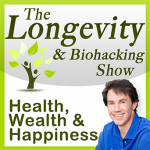To his family and friends, Jason Hartman is a pretty connected guy when it comes to the latest and greatest in wearable technology, but he might have met his match in Chris Dancy, “The Most Connected Man on Earth.” Episode #55 of the Longevity & Biohacking Show features Jason interviewing Chris about topics near and dear to both their hearts.
Meet Chris Dancy
Chris Dancy is touted as “the Most Connected Man on Earth,” and the world is watching those connections carefully. For 25 years, Dancy has served in a leadership role within the technology and healthcare industries, specializing in the intersection of the two.
Chris entered the public dialog concerning digital health as the media started to focus on wearable technology. He earned his moniker by utilizing up to 700 sensors, devices, applications, and services to track, analyze, and optimize his life–from his calorie intake to his spiritual well-being. This quantification enables him to see the connections of otherwise invisible data, resulting in dramatic upgrades to his health, productivity, and quality of life.
Explaining the Quantified Self
Jason has discussed the use of wearable technology with previous guests as a means to creating a “quantified self,” but what exactly does that mean? To people like Chris Dancy, it’s a way to collect information about yourself without the use of keyboards or screens. It’s all about using the body as an input device.
A good example of quantifying yourself would be wearing a Fitbit that keeps track of your activity level and even offers feedback. This little device tracks your movement throughout the day on a 3D plane, then uploads all the info online to be arranged for you in nifty pie charts and graphs. It’s like having a fitness coach in your pocket or on your wrist. While the Fitbit might seem Star-Trekky to some people now, expect to have your mind blown with what will be available in the next five years.
Being Chris Dancy
Chris wasn’t always the Most Connected Man on Earth, but as a database analyst in a former life back in the 90’s, he was always interested in collecting information and looking for those relationships that might not be readily apparent. By 2010 everything he did was on the web, Tweets, blogs, searches, podcasts, videos, etc., were being collected by systems he had set up for that purpose.
By 2011 he had begun to see his life as a big mass that never went offline. With three years worth of data to look at, Dancy wondered what he could do with it? He had turned himself into a wiki! Most people who are interested in quantifying themselves think about it on a more modest scale, but maybe not for long.
It’s So Much More Than Wearable Technology
According to Dancy, we’re entering an age where people cannot afford to live without the Internet. Literally. For the average person, there is no amount of money (other than ALL of it, maybe) that makes it feasible to disconnect for the rest of your life (unless you’re VERY old and in poor health).
Once you accept this reality, the big question becomes what should you do with all of your own information? Just a few things Chris was able to do: lose a bunch of weight and become a Buddhist. But how to go about recording your own information? It’s a formidable task when you’re at square one.
Start Simple
A good place to start might be with your checkbook. Chris suggests you write down how you feel each time you record a money expenditure. Are you angry, happy? Maybe somewhere in between. Years down the road, or maybe months, you will start to see relationships between your emotions and how you distribute your money. See? It’s pretty interesting when you start thinking like that.
You might not realize the extent of the idea, but companies have been using your information to get you to spend money with them for years. Can you say Disney World? The mouse collects and uses your information like you wouldn’t believe. Dancy refers to it as the most surveilled free place on the planet.
All Hail the Magic Band
Disney’s latest way to collect your personal information, and keep the park running smoothly, is called the MagicBand. It’s a benign looking thing. Nothing more than a colorful plastic wrist band that you use to get into your hotel room and Disney parks. You also use it to pay for food and trinkets as you wander good old Walt’s paradise.
But what’s behind all the bright lights and glimmer? A ruthless tracking and marketing machine, that’s what. On the plus side, knowing where you are at all times allows Disney to funnel you to attractions with the shortest lines. On the kind of scary side, it also knows (if you use the MagicBand to pay for food) that you have a fondness for sushi and cheeseburgers, and you just might start finding incredible deals on those two items everywhere you turn. And never fear, they make those MagicBands nigh impossible to resist through benefits of high perceived value.
The Irrelevance of Apps
As a man who never met a good app he didn’t like, Jason is somewhat shocked to hear Chris say that he expects apps to be mostly irrelevant in three years, as people become their own mesh network. Dancy describes this near future as one where each person creates a self-contained network between themselves (and their wearable devices) and the space around them.
The Bottom Line
As this article ends, we haven’t scratched the surface of other parts of the conversation. Listen to the podcast or visit ChrisDancy.com to learn how the dude has turned himself into a real life Truman Show. (Image: Flickr | ChrisDancy)
More from Jason Hartman:
Breakthrough Self-Treatment to Eliminate Chronic Pain
Transferring Consciousness Thru Head Transplants
The Longevity Show
